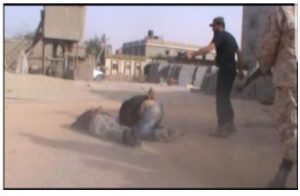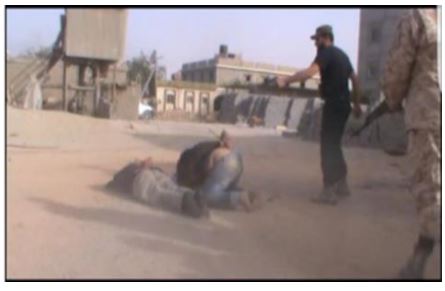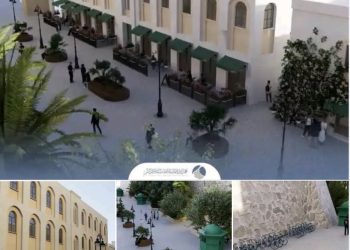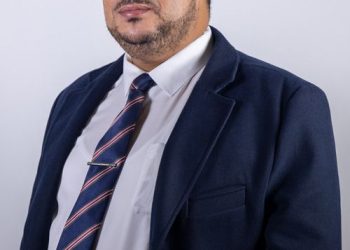By Sami Zaptia.

London, 12 June 2017:
The United Nations reports of numerous cases of kidnappings, arbitrary detention, torture, sexual assault, mass killings and summary executions in all areas of Libya by both groups with and without ‘‘official mandates’’. The assessment came in the UN Libyan Experts Panel final report presented to the Security Council released last week.
The 299-page report said that ‘‘the (UN Libya Experts) Panel continues to receive frequent reports of serious human rights violations. The absence of the rule of law and institutional control over armed groups, some of which continue to operate under official mandates, have led to a deterioration of the human rights situation (in Libya)’’.
‘‘Detention conditions continue to be inhumane throughout Libya, and formal and informal detention centres are under the control of armed groups. Arrests and detentions by armed groups do not respect due process. The Panel received numerous reports of kidnappings and arbitrary detentions used by armed groups for political or material benefit. Politicians, activists, bank employees and journalists are frequent targets’’.
In Eastern Libya ‘‘the Panel received testimonies indicating the existence of “a secret section of the Qarnadah prison” in Shahat. Victims said that they had been kidnapped by a local armed group headed by Ahmad al-Gharour (killed in Ajdabiya in March 2017)”.
”They were later handed over to LNA and imprisoned in a secret section in Qarnadah. Denial of access to sanitation, psychological torture and the “savage beating of some prisoners” were reported. According to testimonies, Munir Belaz and Rabi al-Sharif (from the Salafi al-Tawhid brigade) supervise the secret section. Belaz was officially mandated by the LNA Chief of Staff, Abd al-Razzak al-Nadhuri, to guard the perimeter of the prison’’.
‘’Secret LNA detention centres also exist in the rural areas of Benghazi and are run by Salah al-Huweidi and Mahmud al-Warfalli. In many cases, no prisoners’ lists were made available to human rights organizations and families of detainees’’.
‘‘The Panel also documented cases of torture and a case of sexual assault in the Internal Security Apparatus section in Kuwayfiah, under the command of Colonel Mohammad Idriss al-Seaiti’’.
In Western Libya the UN Libya Experts ‘‘Panel received evidence of mistreatment, torture and denial of access to medical care in the Hadbah prison in Tripoli. Khaled al-Sharif, in charge of the prison, used the detention of key former regime figures in Hadbah to obtain political leverage over former regime constituencies during the national reconciliation talks held in Doha in April 2016. Several individuals in charge of the prison are directly involved in human rights abuses’’.
‘‘Armed groups affiliated with the (self-appointed) National Salvation Government (which had participated in the coup against the democratically elected parliament in 2014) were involved in several cases of kidnapping and torture. The Presidential Security, headed by Mohammad Salem Dimona, used detention centres in the Falah area (the detention centre of the Department for Combating Illegal Migration) and in the Rixos Hotel area. Dimona, who moved to Tripoli International Airport in March 2017, was directly responsible for the kidnapping of several individuals, including high-profile figures’’.
‘‘The Panel received testimonies of kidnappings, arbitrary detention and torture of journalists and activists involving Haytham al-Tajuri, the commander of the Tripoli Revolutionaries Brigade (a mandated militia affiliated with the Presidency Council), currently known as the First Security Division of the Central General Security Administration after it received an official mandate from the National Salvation Government and, later, the Government of National Accord’’
‘‘The Special Deterrence Force, headed by Abd al-Raouf Kara, runs a detention centre in Mitiga (airport compound), where, in a separate section, 300 to 500 individuals are held because of suspected affiliation with “terrorist organizations”.
‘‘The list of those prisoners was not made available to human rights organizations, which could not visit the separate “political” section. The Panel received reports of torture and mistreatment but could not verify these allegations’’.
‘‘In Warshafanah, kidnappings for ransom continue to be widespread. In early 2016, the head of a Warshafanah brigade, Nasr al-Din Bu Omayed, executed a Libyan official detained in his informal detention centres. Kidnappings by the Warshafanah were also motivated by vengeance or to organize an exchange for “their” people who were kidnapped by armed groups in Tripoli’’.
The UN report also detailed what it called ‘’Mass killings’’. ‘‘On 22 July and 28 October 2016, 14 and 10 bodies, respectively, were found in Benghazi. They showed bullet wounds and signs of torture, indicating that the victims had been executed. The Panel understands that at least 10 victims were identified and that some of them had previously gone missing in areas under LNA control’’.
‘‘LNA officials interviewed by the Panel stated that the investigation fell under the authority of the Military Governor of the Darnah-Bin Jawwad region’’.
‘‘On 11 June 2016, the bodies of 11 former regime loyalists were found in Tripoli. They had previously been held at the Ruwaymi detention centre, and a Tripoli court had ordered their release on 8 June 2016. It was reported that the prison administration had deliberately delayed their release and handed them over to an armed group, which executed them. On 8 June 2016, the Dar al-Ifta had rejected the release of former regime prisoners, ruling that it violated Islamic law’’.
On summary executions of prisoners the UN report stated that ‘‘In Sirte and Benghazi, armed groups conducted summary executions of prisoners of war, in clear violation of the Geneva Conventions. Two videos posted on social networks reveal the summary execution of four Benghazi Revolutionaries Shura Council prisoners by LNA personnel, including Colonel Mahmud al-Warfalli’’.
‘‘LNA said to the Panel that Al-Warfalli had been placed under arrest. However, as at 9 April 2017, Al-Warfalli appeared to still operate as the front-line commander of the LNA special forces. In June 2016, the Panel had already received reports that Al-Warfalli conducted summary executions. LNA Salafi commanders have publicly called for the execution of “apostates”.
‘‘Operation Bunyan Marsus brigades also conducted summary executions in Sirte. There have been dozens, according to a field commander of the Operation. The Panel is still investigating those cases’’.
On cases of indiscriminate attacks, the UN report stated that ‘‘ISIL and the Benghazi Revolutionaries Shura Council repeatedly shelled the civilian neighbourhoods of Benghazi under the control of LNA. They also frequently used improvised explosive devices in residential areas, causing the death and injury of many civilians’’.
‘‘In parallel, the LNA leadership showed disregard for civilians trapped in the areas of Qanfudah and Darnah, causing several civilian deaths. Negotiations to allow for a safe evacuation of civilians trapped in Qanfudah were unsuccessful, owing to the lack of real commitment on the part of LNA and the Benghazi Revolutionaries Shura Council’’.
With regards to human rights violations against migrants the UN report states that ‘‘abuses against migrants were widely reported, including executions, torture and deprivation of food, water and access to sanitation. The International Organization for Migration (IOM) also reported enslavement of sub-Saharan migrants. Smugglers, as well as the Department to Counter Illegal Migration and the coastguard, are directly involved in such grave human rights violations’’.
‘‘Abd al-Rahman Milad (alias Bija), and other coastguard members, are directly involved in the sinking of migrant boats using firearms. In Zawiyah, Mohammad Koshlaf opened a rudimentary detention centre for migrants in the Zawiyah refinery. The Panel collected information on abuses against migrants by several individuals. In addition, the Panel collected reports of poor conditions in migrant detention centres in Khums, Misrata and Tripoli’’.







